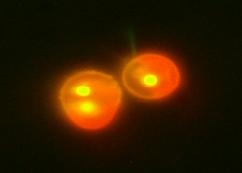Factor4
The key to progress for centuries in agriculture, is based on selection of specific strains or populations. Applying identical strategies to microalgae with high potential for targeted applications remains a major challenge for industrial exploitation.
The varietal selection techniques developed over the centuries cannot be deployed for micro-organisms. Pathways do exist, nevertheless, for selecting a particular phenotype, within a population. Combined with processes that increase the inter-individual variability, these techniques offer alternatives to GMO for very varied criteria such as productivity, tolerance to toxins, molecules of interest, etc.
The Shamash project has succeeded in isolating one of the very first varietal selections in microalgae. This program has brought to light which avenues we need to prioritize in terms of possible selection/mutation techniques, in the face of the diversity of genres and species of microalgae, and has enabled us to double neutral lipid productivity for a strain of Isochrysis affinis galbana.
The methods developed have shown which adaptations need to be extended to diverse microalgae and diazotrophic cyanobacteria, the advantage of these being their independence toward nitrogenous fertilizers.
Individual biological characteristics need to be tagged, and understanding gained in order to better exploit their potential; similarly, technical choices at the selection stage need to be rigorously controlled to ensure selections fulfill stated criteria.
Isochrysis affinis galbana | |
|
|
In parallel, a continuous directed selection approach has been adopted. In collaboration with the Oceanographic laboratory in Villefranche, and the BIOCORE team at INRIA Sophia Antipolis, the Factor4 program strategy is to create a platform geared to selected autotrophic microalgae production, and notably configuring the key elements of such a platform in terms of mutation, tagging, selection, screening and containment techniques.
The overall objective is to produce robust strains, and increased potential for strains from algae stocks.



